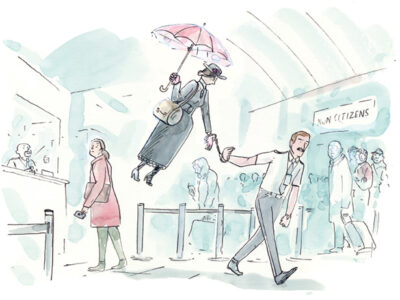
Adventures in communication and culture in Ukraine.
By Cristina T. Lopez
I live and work in Ukraine as a Peace Corps volunteer. Peace Corps was invited to Ukraine, formerly part of the Soviet bloc but now a separate country (although my grandmother still doesn’t believe that), to teach English and assist in environmental and business-development efforts. I am here as a business-development volunteer for two years.
I came to Ukraine with my husband of five months expecting to be sent to the eastern part of the country, perhaps one of the bigger cities such as Donetsk, and learn Russian. Instead, we were sent to the west, to the Ukrainian-speaking city of Lviv.
We had no idea what to expect. From the reaction of those we told, the eyes lighting up, the telling of fond memories, passing on restaurant recommendations, we imagined that it was a good place to be.
It was true. Lviv is a beautiful and old city. This is a standard response given in Ukrainian when people talk about Lviv. But there is so much more to it than that. On a day when it is cold but the sun is out, the buildings shine in their faded glory. Though subdued under the black soot caused by air-pollution, the city’s renaissance architecture, broken statues, and cracked plaster have a subtle, hidden charm.
In the city center, amid the new construction and repairs under way at this UNESCO World Heritage Site, I walk to work. On the way, I pass a myriad of cafés and coffeehouses. A different life exists in this realm. The cafés don’t even open until 10 a.m. I envy the patrons who drink coffee, or kava, and smoke throughout the day: in the summer out on the street at umbrella-covered tables; during the colder months, in a small, crowded interior. But I need to be at work at the Lviv Youth Employment Center.

I turn off of the main street in Lviv, down a small, blocked-off side street and turn into the building. I open the first of two wooden doors. Before I open the second, I hesitate: what will I find there today?
To preface, my center is an all-Ukrainian office. I do have a translator for important communications, but I spend most of my day listening and trying to speak in my beginner-level Ukrainian. Every day is an adventure in communication and culture with lessons in bureaucracy and the way to get things done versus how they should be done. This is what I’m here to help change.
But I am constantly at battle with the language. It is a war I wage with sometimes unforeseen understanding and other times complete misunderstanding. The word that echoes in my ears today with no meaning will be a revelation tomorrow. And so it goes.
One day I came in to discover that my colleague, Halya, whom I was supposed to meet, had gone out. Where? I asked. The answer was long, involving another colleague, Valentina, and the word shuba. In Ukrainian, a fur coat. I imagined that Halya accompanied Valentina to buy a fur coat. It was August but perhaps coats are cheaper then. Ukrainians, like Russians, have not been touched by the idea of animal rights, and furs remain quite popular here. I was told in the winter they are needed and that is rationale enough.
Upon their return, I asked where the coat was and got some hysterical laughter in return. They hadn’t gone to buy a shuba but to see Kashuba to get permission for a new project at my center. As a result, I then understood Kashuba to be the title of someone who heads an administrative department.
I realized a week later that my other colleague, who was pregnant, had the last name of Kashuba. I suddenly understood why she doesn’t do any work for our center but has a desk and computer here: she was Kashuba’s wife. Kashuba isn’t a title. It’s a last name.
Last week, I came in to the center to find out that Kashuba’s wife had had a baby girl. Today I came in to find her desk, one other desk, and a conference table missing. I asked why. I was told that Kashuba owned them and that Kashuba wanted them back. My director had tried to buy the furniture from him but was unable because Kashuba was asking a high price. Basically, Kashuba took back his long-term loans to our center because his wife was no longer working here. Kashuba has that power.
So, I count my blessings: Kashuba didn’t own my computer or my desk. I’m safe for now. I turn the computer on and get to work. On the way home, I pass a lovely coffee house that has managed, New York style, to have outdoor heating. Women sit in their shubas, sip and talk. Sometimes I sit and order a small kava and try to absorb this life. It’s a beautiful old city with cobblestone streets and small statuettes high up on buildings you can only see when you sit in the cafés and stare out. Was it designed this way?
I only met Kashuba once, on an overnight train to the capital, Kyiv. I had a fever and couldn’t partake in the vodka drinking. All Kashuba wanted to know was whether I eat McDonald’s everyday. Why? Because I’m an American. That’s what we do.
Kashuba is not a bad guy, just a Ukrainian with preconceived notions about me. And a man who has the power to take away someone’s desk, cancel an upcoming conference, and give or take away money. In our office, when the phone rings, all you need to say is “Kashuba” and the place goes quiet.
Our director comes running. Kashuba has that power.
After my kava, I walk home. My husband shows me the Ukrainian newspaper with an article full of quotes from Kashuba. Kashuba is everywhere in my life. That is Lviv, a city of 800,000 residents but with the feeling of a small town. It is the kind of place where people like Kashuba have a lot of power.
But we can’t dwell on Kashubas or shubas. We have to keep looking beyond the miscommunications and bureaucracy. It’s easy here to get caught looking straight ahead all the time, running for the phone, fighting the daily battles. Perhaps the answer is the kava. In Lviv, the cafés are not just recreation but a reminder to a city to stop once in a while and see what is beyond the first story. Lviv is a living lesson in looking not just forward, but up. There are greater things for Ukraine.
Cristina T. Lopez C’97 is currently serving as a U.S. Peace Corps volunteer with her husband, Thomas, in Lviv, Ukraine. Her first book, Finding Francis, was published in 2003 and is available on Amazon.com.




